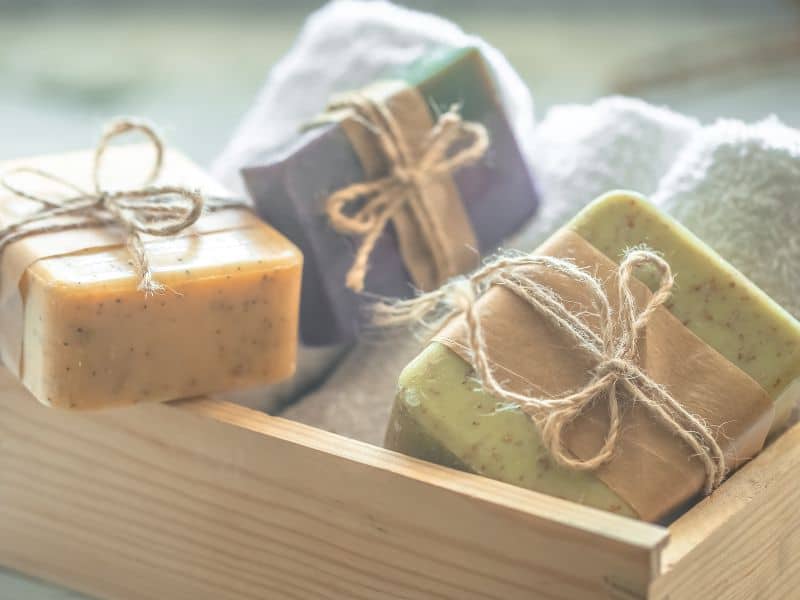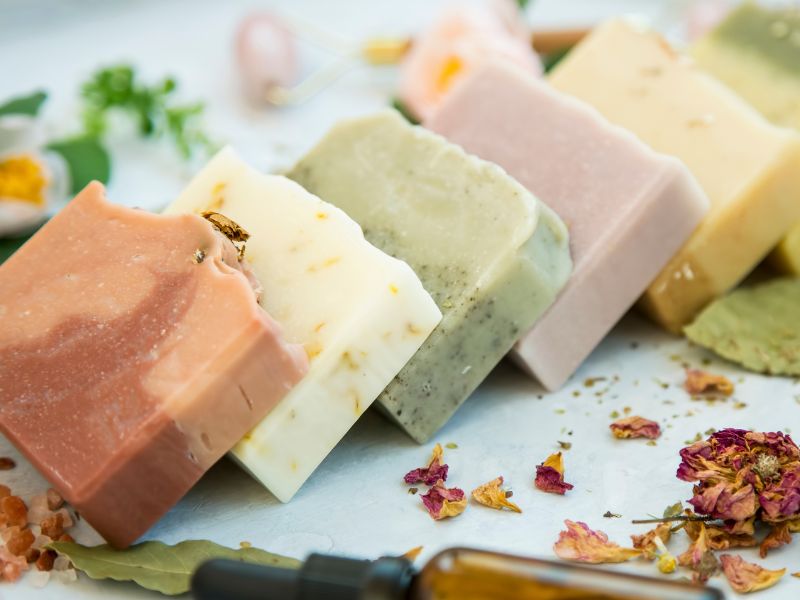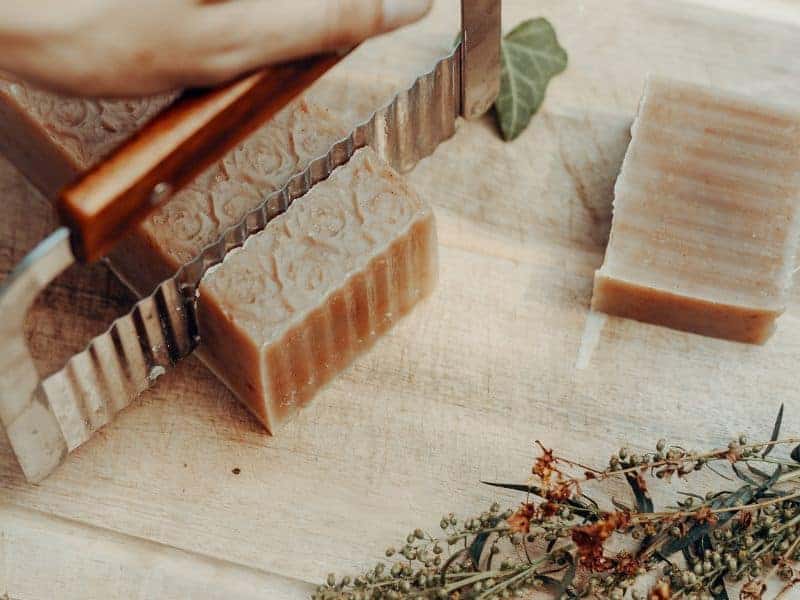Melt and pour soap is easy to make and requires minimal supplies, making it ideal for beginners or those who don’t have much time, but is it considered handmade? In this article, we are going to answer that question and get to the bottom of what exactly it means for something to be handmade.
Melt and pour soap is considered handmade because it requires hand-crafting techniques, even if it starts with a pre-made soap base. The soap base is melted and poured into molds and can be customized with additional ingredients.
For example, adding scents and colors to the soap base will affect the final product. This customization is what makes it unique and ultimately ‘handmade’. However, there are some who would argue that melt and pour soap isn’t really handmade because it requires so little effort from the maker. Let’s take a closer look.
Melt and Pour Soap Explained
Melt and pour soap is a type of soap that uses a premade soap base that is melted down and customized with additives such as essential oils, herbs, or natural colorants. The result is a unique handmade product that can be enjoyed by both the maker and the user.
The process of making melt and pour soap is relatively simple and only requires a few basic supplies. All that is required is a microwave-safe bowl or container, a soap base (which can be either glycerin-based or goat milk based), and any additives you want to include such as essential oils, herbs, natural colorants, etc.
Definition of Handmade Soap
When you dig into “handmade” actually means you may be surprised. It literally means made by hand, not by machine. So when you are working with melt and pour soap, it is literally handmade.
Definition according to the FDA
In the US, the FDA has a specific definition that soapmakers must follow. According to the FDA, handmade soap is made primarily by hand using a variety of methods, which can include traditional cold-process soapmaking, hot-process soapmaking, and even melt and pour soapmaking.
Characteristics of handmade soap
Handmade soap is often made in small batches, allowing soapmakers to have more control over the ingredients used and the overall quality of the soap. Additionally, handmade soap is often formulated with natural ingredients, such as plant-based oils, herbs, and essential oils, which can provide various benefits for the skin.
Importance of using natural ingredients
Commercial soaps are often loaded with synthetic fragrances, preservatives, and other chemicals that can strip the skin of its natural oils and cause irritation. By using natural ingredients, handmade soap can provide a gentle and nourishing cleansing experience, without any harsh chemicals.
Why Melt and Pour Soap Can Be Considered Handmade
Melt and pour soap is made by hand. While the base itself may not be made from scratch, the soapmaker still has to physically melt it down, add fragrance and other additives, and then pour it into a mold. This is a labor-intensive process that requires skill and attention to detail.
The soap is made by hand
Melt and pour soap is made by hand. While the base itself may not be made from scratch, the soapmaker still has to physically melt it down, add fragrance and other additives, and then pour it into a mold. This is a labor-intensive process that requires skill and attention to detail.
The soap base is a natural ingredient
The soap base used in melt and pour soap is a natural ingredient. Typically, it’s made from a combination of oils and lye, which have been pre-mixed and poured into a block or loaf. This means that the soapmaker doesn’t have to worry about handling lye, which can be dangerous if not handled properly.
The soap can be customized with additional ingredients
It can be customized with additional ingredients. This means that the soapmaker can add their own unique touch to each bar of soap, whether it’s by adding essential oils for fragrance or herbs for exfoliation. The possibilities are endless!
Fair Packaging and Labeling Act (FPLA)
The United States requires certain information to be included on product labels to protect consumers from false or misleading information. If you’re a soap maker, here are the requirements for labeling your soap products under the FPLA:
- Identity statement: You must include an identity statement on your soap label that accurately identifies the product. This can be as simple as “soap” or can include additional descriptors such as “handmade” or “organic.”
- Net quantity statement: You must include a net quantity statement on your soap label that accurately indicates the weight or volume of the product. This statement must be in both metric and US customary units.
- Name and address of the manufacturer or distributor: You must include the name and address of the manufacturer or distributor on your soap label. This helps consumers contact the company if they have any questions or concerns about the product.
- Ingredients statement: You must include an ingredients statement on your soap label that lists all the ingredients in the product in descending order of predominance by weight. This includes both the ingredients in the soap base and any additional ingredients you may have added.
These guidelines are important to inform consumers about what type of products they are getting and what they should expect from those products.
Why Handmade Designation Matters
Being able to label a product as handmade carries with it certain benefits. It gives the soapmaker credibility and ensures that customers know they are getting a quality product that has been carefully crafted by hand. Let’s take a look at what that means.
Importance of Transparency for Consumers
Transparency is key when it comes to handmade products. Consumers want to know exactly what they’re buying and where it comes from. Labeling a product as handmade shows that the maker is proud of their work and wants to be transparent about the production process. This creates a level of trust between the consumer and the maker.
Legal Implications
There are legal implications when it comes to labeling products as handmade. In some countries, there are specific regulations that dictate what can and cannot be considered handmade. For example, in the United States, the Federal Trade Commission (FTC) has guidelines for labeling products as handmade. These guidelines are in place to protect consumers from false advertising and ensure that products are accurately labeled.
Consumer Preferences
Consumer preferences play a big role in why the handmade designation matters. Many consumers are looking for products that are unique and made with care. Handmade products offer a level of quality and attention to detail that can’t be found in mass-produced items. Plus, by buying handmade, consumers are supporting small businesses and artisans, which is always a good thing!
Frequently Asked Questions
The handmade label does increase the perceived value of a product. This is because it implies that the item has been crafted with care and attention to detail. Consumers are willing to pay more for handmade items because they feel they are getting something special and unique.
Yes, handmade products are often considered to be of higher quality than mass-produced items. This is because each item has been crafted with individual care and attention to detail. Handmade items also tend to be more durable and last longer, which means they are a better investment for the consumer.
Yes, there is a large and growing market for handmade soap. Consumers are increasingly looking for products that are natural, organic, and made with care. Handmade soap offers all of these qualities, making it a popular choice among buyers.
Yes, you can make a profit from selling handmade soap. The key is to find the right market for your product and create a pricing strategy that is attractive to buyers. You’ll also need to invest time and resources into marketing your product so that people know it exists.
Conclusion
In conclusion, it’s important to understand the implications of labeling your product as handmade. It carries a certain level of trust and credibility with consumers, which can be invaluable for your business because melt-and-pour soap is handmade.
Transparency is key when it comes to handmade products, so make sure you are clear about what ingredients are in your soap and where they came from. By following these guidelines and understanding why the handmade designation matters, you’ll be well on your way to creating quality products that people will love.






